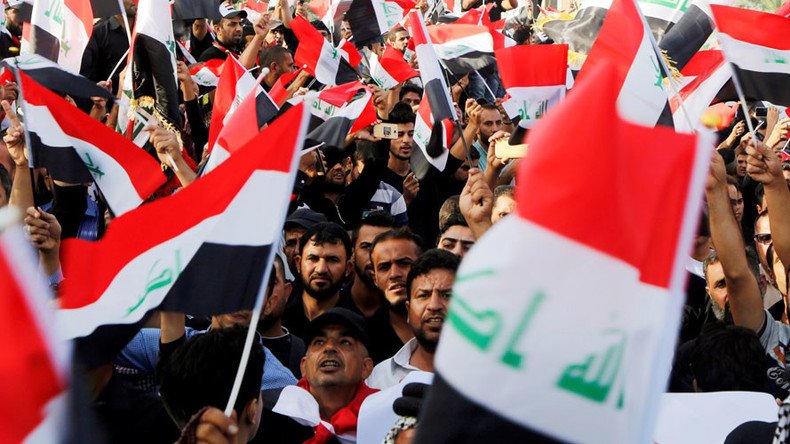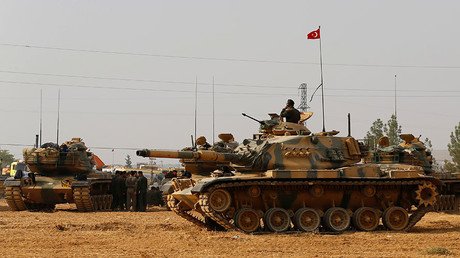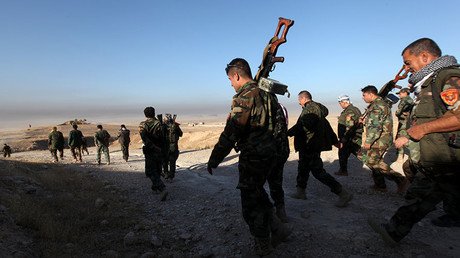‘Get out, Erdogan!’ Huge demo in Baghdad protests Turkey’s Iraq presence

Thousands of Iraqis surrounded the Turkish embassy in Baghdad on Tuesday to protest Turkey’s continued military presence in their country, as well as its stated intention to take part in the ongoing battle for Mosul Islamic State’s key stronghold in Iraq.
Huge protests in #Baghdad today outside the Turkish embassy vs. the Ottofascist rhetoric from #Turkey re: #Mosul. pic.twitter.com/YFOmN03pIO
— Haidar Sumeri (@IraqiSecurity) October 18, 2016
“Get out occupier!” shouted members of the crowd, many of whom were adherents of powerful Shia cleric Muqtada al-Sadr, a particularly vociferous opponent of Sunni Turkey. “Fight terrorism in your own country,” read a placard held up by one of the protesters.
Protests Against #Turkey in Baghdad:
— Ari Murad (@Arimurad) October 18, 2016
Thousands of #Iraq-is gathered outside the Turkish Embassy to protest Turkey's interference in #Mosul. pic.twitter.com/7CzGaNDRcf
“We condemn Turkish interference in Iraqi affairs. No one should trespass and occupy Iraqi soil,” said a representative of al Sadr, AP reports.
#Turkeyout_Turkeyout
— Baraa Malik (@AlbadranBaraa) October 18, 2016
Today in Baghdad a lot of protesters shouted against turkey interference in #Iraq affairs particularly in #Mosul battle pic.twitter.com/O73XuKGqep
A contingent of Turkish troops and a tank battalion have been stationed in the Iraqi settlement of Bashiqa since March of 2015 – purportedly to train local troops to fight Islamic State (IS, formerly ISIS/ISIL). Turkish media say there may currently be up to 700 Turkish nationals at the base, and Ankara says that 3,000 Iraqi fighters trained there are taking part in the fierce fighting to retake Mosul from IS, which has held it since June of 2014.
Iraq has repeatedly asked Turkey to withdraw its troops, claiming the deployment is a breach of its sovereignty, and government figures have regularly participated in protest rallies scheduled outside the Turkish mission in Baghdad.
A delegation was sent from Ankara to try to negotiate the status of the base on Monday, but the following day Iraqi media reported that the talks hadn’t borne fruit.
Meanwhile, an incensed Prime Minister Haider al-Abadi warned Turkey that taking part in the battle for Mosul, the country’s second-largest city, would be a “fatal mistake.”
“The entry of the Turkish forces into Iraq will not be a picnic,” al-Abadi told assembled foreign ambassadors in a statement.
On Tuesday, Turkish Prime Minister Binali Yildirim claimed that Turkish warplanes were already bombing IS targets inside Mosul, though later seemed to go back on his comments, clarifying that Turkey’s air force would participate in the strikes as part of the international coalition “in principle.”
Regardless of whether Turkey is already taking part in the battle or not, President Recep Tayyip Erdogan has no plans to back down.
“What do they say? Turkey shouldn’t enter Mosul. Why can’t we enter? We have a 350-kilometer border [with Iraq]. Others who have nothing to do with the region are entering it,” Erdogan said on Monday.
“We will not be responsible for the negative consequences that will emerge from any operation that doesn’t include Turkey. We will be involved both in the operation and at the [negotiating] table afterward. It is not possible for us to stay excluded,” he stressed.
Turkey’s anxiety about its role in the re-capture of Mosul goes beyond its desire to take credit for defeating Islamic State.
Ankara is alarmed about the leading role being played by Kurdish Peshmerga fighters, who are spearheading the new offensive, and worried that battlefield successes may allow them to make stronger case for statehood – a prospect that Erdogan has categorically rejected.
Turkish diplomats have also expressed worries about the treatment of Sunnis – a majority in Mosul – if the city is entered by the predominantly Shia forces of the Iraqi army and militias. Turkish analysts have also claimed that a Shia-led victory in Mosul will give a stronger hand to regional rival Iran.















